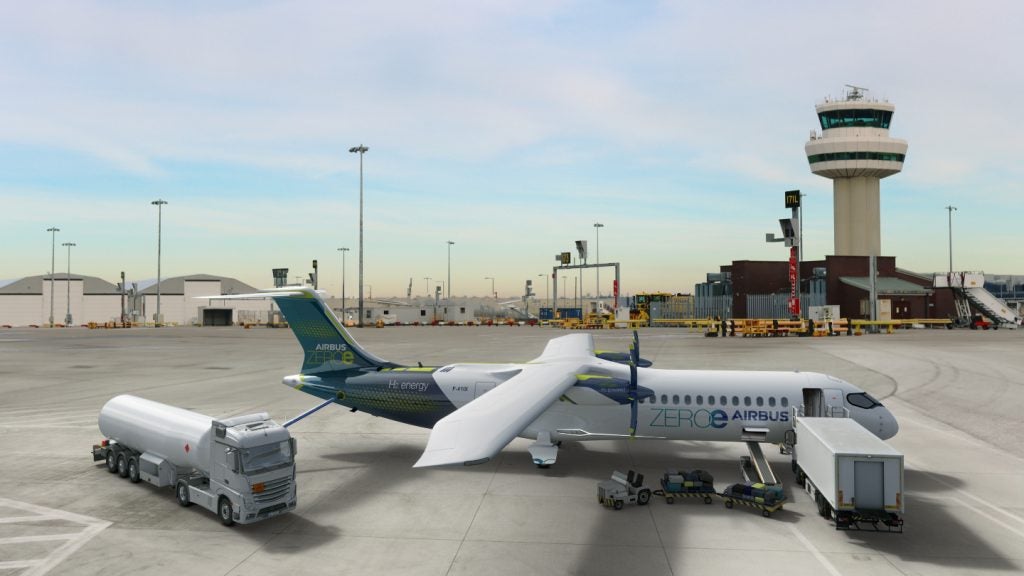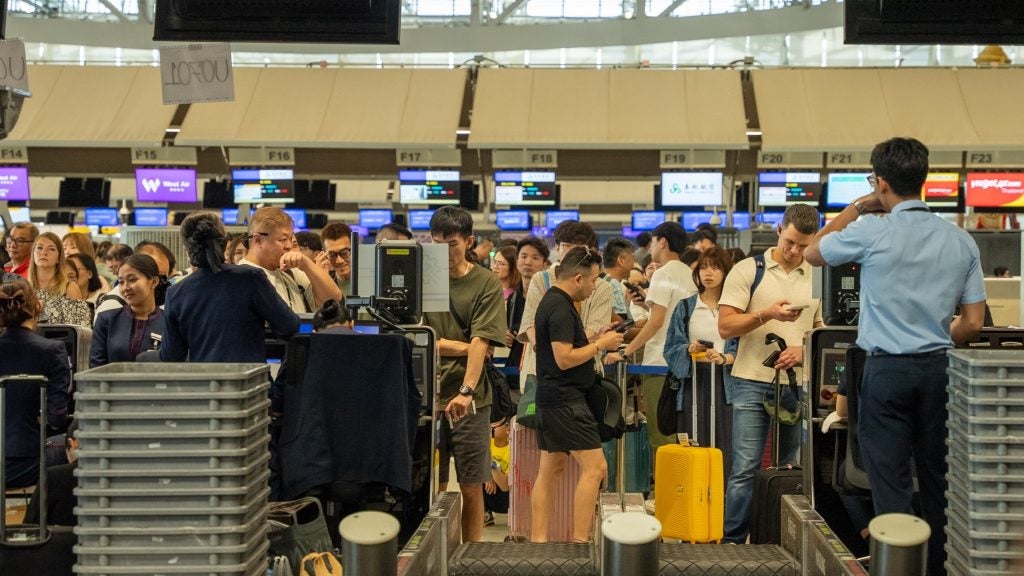Pilots lead as Airport Technology lists the top five terms tweeted on airlines in Q4 2021, based on data from GlobalData’s Travel and Tourism Influencer Platform.
The top trends are the most mentioned terms or concepts among Twitter discussions of more than 150 airlines experts tracked by GlobalData’s Travel and Tourism Influencer platform during the fourth quarter (Q4) of 2021.
1. Pilots – 583 mentions
Pilot shortage affecting regional airlines in the US, automation start-up Skyryse’s flight automation technology reducing pilot workload, and US-based airline United Express grounding regional jets due to pilot shortage were some of the popular discussions on pilots in Q4 2021.
Jon Ostrower, editor-in-chief at aviation and aerospace focused website The Air Current, shared an article on how the shortage of pilots is affecting regional airlines in the US and impacting the recovery of the aviation industry. A large number of pilots left their jobs after accepting severance packages as they approached retirement age. Airlines have been forced to shuffle the available pilots, which is leading to shortages and creating operational challenges. The continued pilot shortage can threaten the recovery of the aviation industry to pre-pandemic levels and create long-term challenges, the article highlighted.
Pilots was also mentioned by aviation journalist Charles Alcock in a tweet about Skyryse securing $200m in a Series B funding round, which will help the company to certify its FlightOS system being developed in collaboration with Robinson Helicopter and four other manufacturers. FlightOS is designed to increase safety by decreasing pilot workload and training requirements. The system uses a touchscreen tablet display and a joystick to replace some of the more complicated controls found on a normal general aviation flight deck. The technology can tackle safety issues due to pilot errors and delays caused by bad weather by introducing commercial aviation safety standards to general aviation. Skyryse has raised total funding of $250m with the new funding round, the article detailed.
See Also:
In another tweet, Ben Mutzabaugh, senior aviation editor at travel website The Points Guy, shared an article on United Express grounding 100 regional jets due to pilot shortage. United Express’ CEO Scott Kirby noted that staffing issues are impacting the 50-seater regional aircraft operations, as a result of which the markets that depend on the aircraft will lose service. The airline has discontinued regional service to 11 cities including Twin Falls and Idaho. It has proposed redirecting funding to pilot training through Essential Air Service, a federal government subsidy, as part of a long-term strategy to boost the supply of pilots.
How well do you really know your competitors?
Access the most comprehensive Company Profiles on the market, powered by GlobalData. Save hours of research. Gain competitive edge.

Thank you!
Your download email will arrive shortly
Not ready to buy yet? Download a free sample
We are confident about the unique quality of our Company Profiles. However, we want you to make the most beneficial decision for your business, so we offer a free sample that you can download by submitting the below form
By GlobalData2. Passengers – 502 mentions
Malaysian airline AirAsia allowing only fully vaccinated passengers to board flights, low-cost carrier Ryanair’s passenger numbers remaining lower than pre-pandemic levels and airlines in Europe agreeing to refund passengers for cancelled flights, were some of the discussions on passengers in Q4.
Jamie Freed, a journalist, shared an article on AirAsia allowing only fully vaccinated adult passengers to board its flights. The airline requires unvaccinated passengers under the age of 18 who have not been vaccinated to be accompanied by a vaccinated family member. The requirements are part of the airline’s Covid-19 mitigation plan. Passengers are also required to check in through the airline app to limit physical interaction at the airport clearance and boarding process, the article highlighted.
In another tweet, Simon Calder, senior travel editor at online media The Independent, shared an article on Ryanair carrying 39.1 million passengers between April and September 2021, which is 55% less than those carried during the same period in 2019. The percentage of seats filled or load factor averaged at 79% compared with 96% in 2019. Consumer confidence was impacted during the period due to the inconsistent travel restrictions implemented by the UK government although bookings surged for the October and Christmas period, according to the article. The airline’s losses also reduced by nine times to $55.6m compared to the same period in 2020.
Another discussion on passengers was shared by The Points Guy on 16 airlines in Europe agreeing to refund passengers for cancelled flights. The agreement follows a discussion held by the airlines with the European Commission and Consumer Protection Cooperation (CPC). The 16 airlines include Aegean Airlines, Air France, Alitalia, Austrian Airlines, British Airways, Brussels Airlines, easyJet, Eurowings, Iberia, KLM, Lufthansa, Norwegian, Ryanair, TAP Portugal, Vueling and Wizz Air. The airlines also agreed to provide better notice to passengers when flights are cancelled. They are now required to distinguish between passenger-cancelled flights and airline-cancelled flights and offer rerouting or a cash refund in the event that a flight is cancelled by the airline, the article highlighted.
3. Sustainability – 239 mentions
The Fit for 55 package introduced by the European Union (EU) to reduce emissions, sustainable aviation fuels (SAFs) reducing the use of petroleum jet fuels, and sustainable fuels company Velocys Renewables’ aviation fuel supply deals were among the popular discussions on sustainability in the last quarter.
Eamonn Brennan, director general at civil-military organisation EUROCONTROL, shared an article on the EU introducing the Fit for 55 package to reduce emissions by at least 55% by 2030 with the aim to make Europe the world’s first climate-neutral continent. The package includes multiple proposals including the revision of the EU Greenhouse Gas Emissions Trading System to phase out free allowances offered to aircraft operators. The revision will enable the commission to reduce the emissions limit by 4.2% a year against the current 2.2% to fulfil the 2030 emission target.
The EU also aims to increase the use of SAFs through the ReFuelEU Aviation proposal. Another proposal under the package is to revise the Energy Taxation Directive, end fossil-fuel subsidies and revise tax exemptions for jet fuels for business and leisure flights. Furthermore, a new Alternative Fuels Infrastructure Regulation (AFIR) is planned for airports to develop electric infrastructure, the article noted.
Isaac Alexander, editor-in-chief at aerospace and defence news blog Jet City Star, tweeted on how SAFs can reduce the use of petroleum jet fuels. Made from agricultural or recycled fatty goods, SAFs emit carbon, but at a considerably lower rate than fossil fuels. EU’s 2030 climate target aims to boost the use of SAFs blended with jet fuel to 5% by 2030 from the current usage of less than 1%. Oil company Shell and oil refining company Neste are investing in producing renewable fuels that can cover the majority of the demand for SAFs in Europe. The cost of producing the fuel, however, is one of the biggest hurdles in producing SAFs, the article highlighted.
In another tweet, freelance aviation and travel writer Paul Thompson shared an article on Velocys Renewables’ aviation fuel supply deals with Southwest Airlines and British Airways. Southwest Airlines will purchase 219 million gallons of SAFs for a period of 15 years, which will be supplied by Velocys’ Bayou Fuels biorefinery. Velocys also signed a memorandum of understanding with the International Consolidated Airlines Group, which includes British Airways, Aer Lingus, and Iberia. The deal includes the supply of 73 million gallons of SAF for ten years. The fuel will be also supplied by the Velocys’ Bayou Fuels biorefinery, which is expected to commence operations in 2030, the article highlighted.
4. Cargo – 213 mentions
Air Canada increasing cargo capacity to support the economic supply chain in British Columbia, Global Crossing Airlines’ (GlobalX) passenger aircraft entering cargo conversion, and Dubai limiting cargo imports to clear shipment backlogs were among the popular discussions around cargo in Q4.
Howard Slutsken, owner and president of consulting services provider Wingborn, shared an article on Air Canada increasing cargo capacity into and out of Vancouver to help the supply chain network affected by floods in British Columbia. The airline increased its cargo capacity by 586 tonnes (t). It rescheduled 28 passenger aircraft from narrow-body aircraft to be operated with wide-body aircraft, which will enable an additional 282t of goods to be transported across the country. Air Canada will also operate 13 cargo flights from its hubs in Toronto, Montreal and Calgary using wide-body aircraft, the article detailed.
Cargo was also discussed by an online platform for commercial airline news and market intelligence in an article on GlobalX’s first A321 passenger aircraft entering the first phase of conversion to freighter aircraft. The aircraft will first undergo maintenance at aircraft engineering and maintenance company Hong Kong Engineering Company’s (HAECO) facility in Florida, US. It will then undergo cargo conversion at Precision Aircraft Solutions’ facility in Orlando. It is the first of four A321 units planned to be converted and leased to the airline by Greenwich Highland Aviation (GHA). It is expected to be delivered in July 2022, the article detailed.
In another tweet, Isaac Alexander shared an article on Dubai limiting cargo imports into its international airport to clear the large inbound cargo shipments backlog. Dnata, the cargo unit of state-owned airline group Emirates, stated that transit cargo bound to other destinations in the United Arab Emirates will be subject to the restrictions. The cargo backlog was caused by labour constraints, although the group has brought newly trained staff to deal with the increased volumes.
The Emirates Group declared a loss of $6bn for the financial year ending March 2021 and laid off nearly a third of its staff due to travel restrictions that grounded majority of its aircraft. Dnata also reduced headcount by 29%. Cargo operations, however, declined by just 5% as freighter activity continued to grow to destinations such as the US and Australia, the article highlighted.
5. Coronavirus Disease 2019 – 156 mentions
Southwest Airlines implementing the US President Joe Biden federal vaccine mandate, Ghana’s international airport planning to fine airlines that carry unvaccinated passengers, and the US introducing Covid-19 international travel requirements were popular discussions in Q4 2021.
The Points Guy shared an article on Southwest Airlines implementing the federal vaccine mandate announced by US President Joe Biden despite objections from its pilot’s union. The President’s vaccine mandate applies to companies with more than 100 employees, including weekly testing as an option, but does not apply to federal contractors. Southwest Airlines announced that employees are required to be completely vaccinated against Covid-19 allowing an exception for a religious, medical, or disability reason. The airline’s pilots union, however, warned that the mandate could lead to the exodus of pilots and requested to exempt pilots from the vaccine mandate, the article noted.
Alex Macheras, an aviation analyst, shared an article on the plans of Kotoka International Airport in Ghana to penalise airlines that carry unvaccinated passengers. The airport plans to fine $3,500 to airlines for each passenger who is either unvaccinated or tests positive for coronavirus upon arrival in the country. The stringent measures are being implemented as vaccination efforts in the country have been impacted by logistics issues and several cases reported in the country have been associated with Covid-19 cases recorded at the Kotoka airport, the article highlighted.
In another tweet, David Koenig, business writer at The Associated Press, shared an article on the US introducing new Covid-19 international travel requirements. The new guidelines exempt children under the age of 18 and people from countries with vaccine shortages although most travellers to the US will be required to be vaccinated against Covid-19. The new rules will require airlines to gather contact information on passengers regardless of whether they have been vaccinated to aid with contact tracing if necessary. In addition, vaccinated passengers will be required to produce proof of a negative Covid-19 test within three days of travel, while those who have not been vaccinated will be required to show documentation of a test done within one day of the flight. The guidelines are aimed at removing restrictions for non-essential travel for various countries and encouraging more Americans to get vaccinated, according to the article.








Related Company Profiles
Southwest Airlines Co
The Emirates Group
Air Canada
Ryanair Holdings Plc
easyJet Plc